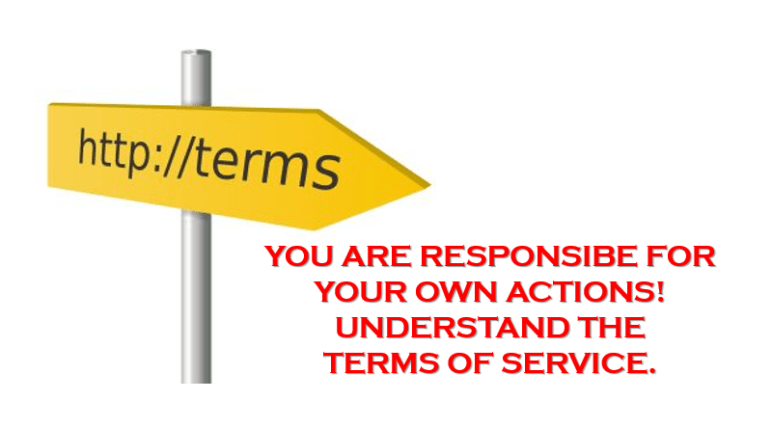In my practice I write and review website terms of service with some regularity. Most website Terms of Service have sections that relate to a users online conduct; that is, the rules that the website expects you follow when using their website. If you don’t read anything else (because let’s fact it, unless you LOVE fine print, you probably aren’t going to read it) you absolutely should review the section that discusses what conduct is expected of you. If you aren’t going to follow the rules don’t use the website.
Yes, this sounds like a no-brainer, right? You’d think so, however, you would be fascinated to learn how many people don’t pay attention to these things and then, when they get busted breaking a Terms of Service rule, they come back and try to blame the website for the rule! Um, no. How about you try taking some responsibility for your own actions? Yeah, let’s try that.
WHAT DO THE TERMS OF SERVICE SAY ABOUT MODIFICATION OR REMOVAL OF CONTENT?
Many websites will allow users to post content and then edit or remove the postings at a later date. Consider sites like Facebook for example. Other websites will give you only the ability to delete postings, but not edit, as seen with sites like Twitter. At the same time many websites will not allow a user to edit or remove information once it is posted, regardless of the circumstances.
I typically see these no-removal rules often with complaint/review styled websites and this information is usually spelled out in the Terms of Service and, in some cases, elsewhere on the website. Why would a website make such a rule? Some websites claim that the reason they have a no removal policy, especially on a review/complaint type website, is because those websites believe that people will be bullied into taking truthful content down when the public really should be warned about bad actors or bad businesses. I suppose the websites figure that if they have a rule against removing content, it doesn’t do the bad actors or bad businesses any good to harass the poster because the information is going to remain up anyway. Yes, I know this opens Pandora’s Box for the “but what if…” statements and I know well the arguments against such non-removal rules, but I will not engage in that here because I’d be writing a dissertation and I’m trying to keep on topic and make this relatively short.
TERMS OF SERVICE: WHY YOU SHOULD CARE.
Unfortunately, from my perspective, most people don’t care about these kinds of things and go on there merry way using a website, posting content, etc, – until they are threatened with litigation over something they posted. Defamation is against the law and is actionable. Most websites will make you agree, per their terms of service, that you will not do anything illegal. They might even spell out that you have to tell the truth if you are posting a complaint or review. Unfortunately, people either can’t read, don’t know what “truth” means, or otherwise don’t give a crap because they write stupid stuff anyway. If you say something mean and untruthful online about someone else or someone else’s business – there is a possibility that you will see a defamation action against you. Heck, even if what you say is truthful, you still could see a defamation action against you. It’s the way the world these days – people sue over the most ridiculous stuff! Yes there are defenses to such claims, like the truth, however, if you use an attorney, it’s going to be legal battle that you will have to fund.
Typically a person considering litigation is going to go the easiest route and ask the person who posted the information to simply remove it. If the person posted the information to websites like Facebook or Twitter, chances are one can just log into their account, edit or delete the content at issue, and be done with it. HOWEVER, what happens when you posted the content to a website that specifies, right in their terms of service, that you can’t remove the posting? If that is the case, chances are, that content isn’t coming down – even if you ask and regardless of the situation.
DON’T BLAME THE WEBSITE FOR YOUR MISTAKE.
Now we are getting to the ironic part. A person will use a website, knowingly break the rules (such as posting false and defamatory stuff) and then, when they get a letter from a lawyer or a lawsuit against them, all of the sudden get concerned about what they wrote and will try to figure out how to take it down. It’s like when you’ve been speeding, know you were speeding, and act all surprised when you get pulled over by a cop and quickly try to make an excuse for why you were speeding – as if that is going to somehow change the fact that you broke the law by speeding. When an author gets a letter from a lawyer about a posting online the first thing they do is try to take it down. In some instances they can remove the content…but that doesn’t always work as I explained above. It amazes me how many people will write to a website asking for their stuff to be removed even when the terms of service, and the fact that someone can’t remove something after it was posted, was made abundantly clear before they made the posting. When they get told “no” somehow that comes as a shock. What happens next, in my experience, is one or any combination of the following:
- Excuses of why they wrote what they did. The whole I was mad/sad/hurt shouldn’t have done it story. This is what I call fools remorse.
- Allegations that “someone else” wrote it. People will literally allege that their “minor child” wrote the sophisticated well written posting about a business dealing. Uh huh, sure they did…and way to throw your kid under the bus.
- Stories of how the author/user of the website is “special.” Most people that claim “special circumstances” aren’t all that unique when compared to anyone else. I know your momma thinks you are special – but a website probably isn’t going to think so.
- Statements of “I wrote it. It’s false…so you HAVE to take it down!” No, actually the website doesn’t (at least under current federal law) and are you basically admitting that you breached the contract with the website that said you wouldn’t post something that is false? Hmmm, that doesn’t seem like a very smart argument.
- I’m going to sue you if you don’t take it down! Cool story – the current law doesn’t support your position and you are making yourself look like ass. By the way, those terms of service that you agreed to by using the website or otherwise “checking the box” saying you agreed – yeah, that’s called a contract.
I wish I was making this stuff up but I have literally seen all of these kinds of excuses/stories made by people who are getting into trouble for what they posted online. If you are one of THOSE people – you deserve to get into trouble. The most ridiculous position that one can take is to be mad and blame a website for having known consequences to a rule THAT YOU BROKE. That’s like being mad at the law makers who created the speed limit when you get into trouble because you broke the law by speeding! No one made you speed. Own the problems that you create.
Bottom line; read the Terms of Service before you use a website. If you break the rules (especially if you are a harasser or defamer) don’t get mad at the websites for having the rules and consequences (that you failed to consider when you broke the rules) applied to you. You have to own and accept responsibility for your actions – regardless of how hard of a pill that is to swallow.
Until next time friends…
All information contained in this blog (www.beebelawpllc.blog.com) is meant to be for general informational purposes only and should not be misconstrued as legal advice or relied upon. All legal questions should be directed to a licensed attorney in your jurisdiction.



